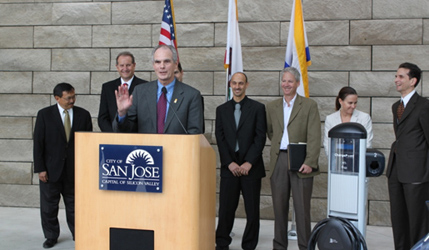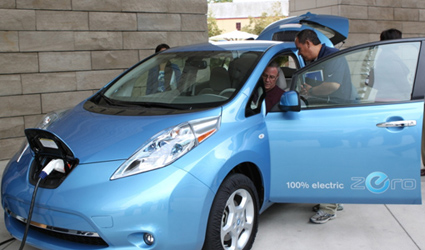The Metropolitan Transportation Commission (MTC) is taking a page from Ralph Waldo Emerson, who famously said, “All life is an experiment. The more experiments you make, the better.”

San Jose Mayor Chuck Reed speaks at the press conference announcing $14 million in climate grants from MTC for several electric vehicle demonstration projects. © 2010 Bay Area Climate Collaborative
By John Goodwin
Published: December, 2010
With the Bay Area emerging as the U.S. epicenter of electric vehicle activity, so-called EV initiatives received the biggest chunk of the grant money — $14 million. The largest grant was a nearly $7 million award to the San Francisco Municipal Transportation Agency, the city of San Jose and Palo Alto-based Better Place to help demonstrate electric taxis in San Jose and San Francisco. Modeled on a Tokyo program spearheaded by Better Place, each of the 61 EV taxis in the Bay Area will feature switchable batteries to cut down on time lost to recharging. “The battery switch model is gaining momentum globally,” explained Jason Wolf, Better Place’s vice president for North America. “Our Tokyo EV taxi program has proven to be an example to major metropolitan areas around the world, and we are pleased that the Bay Area is taking a leadership position in the U.S.”
MTC’s other grants for EV programs include $1.7 million to deploy 19 electric vehicles in the City CarShare fleet in San Francisco and the East Bay; $2.8 million for a two-year national demonstration project that calls for the purchase of 90 electric vehicles — including 79 Nissan Leafs — and accompanying Level 2 chargers for use by public agencies in Alameda, Marin, Santa Clara and Sonoma counties; plus $2.4 million for EV infrastructure programs such as the installation of charging stations.
A partnership involving VTA, SamTrans, Muni and the Bay Area Air Quality Management Air District received almost $4.3 million for a pilot bike-sharing program through which 1,000 bikes will be available for use at 100 kiosks in San Francisco, San Jose, Mountain View, Palo Alto, Redwood City and other cities along the Caltrain corridor. The Port of Oakland won a $3 million grant to install the infrastructure needed to allow ships at one of its 18 international berths to turn off their auxiliary diesel engines and plug into the electrical grid while loading or unloading cargo. This Shore Power initiative is planned as the first step in the eventual transformation of all the port’s international berths and its eight marine terminals. MTC’s other grant awards included:
• $2 million to demonstrate cold in-place asphalt recycling — which eliminates the need to produce new paving material or transport it to the worksite — on roadway projects in Napa and Sonoma counties;
• $1.5 million for the city of San Jose to test eight different bicycle detection and count systems at signalized intersections around the city;
• $2 million for the city of Berkeley to begin dynamic pricing of parking spaces in the Southside and Elmwood districts, and take other steps to help reduce the number of auto trips in the city;
• $1.5 million for a multi-agency partnership to demonstrate dynamic ridesharing technology in Sonoma, Marin and Contra Costa counties;
• Almost $1.5 million for SamTrans to implement car-sharing, short-distance vanpools and other transportation demand-management (TDM) tools in and around downtown Redwood City;
• $750,000 for the San Francisco County Transportation Authority to establish a forum for various TDM initiatives; and
• $600,000 for a partnership between the Sonoma County Transportation Authority and the city of Santa Rosa to restructure Santa Rosa’s Guaranteed Ride Home program, its commute pass and youth pass programs, and other TDM strategies.
MTC awarded the grants with an eye toward eventually expanding the programs that deliver the biggest bang for the buck. “We selected the projects that have the biggest potential for reducing greenhouse gas emissions and that can be replicated regionwide,” said MTC Chair and Alameda County Supervisor Scott Haggerty.
John Goodwin is a public information officer for the Metropolitan Transportation Commission

One of the grants will fund a demonstration project placing 90 electric vehicles in public agency fleets around the region. © 2010 Bay Area Climate Collaborative

A series of four grants totaling $2 million will fund programs promoting safe routes to schools for kids who walk or bike. Photo by Noah Berger

